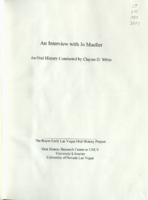Search the Special Collections and Archives Portal
Search Results

Mike Meade interview, February 28, 1977: transcript
Date
Archival Collection
Description
On February 28, 1977, collector Steve Gortz interviewed Mike Meade (b. September 16, 1950 in San Francisco, California) about his life in Nevada. Meade speaks about growing up in Tonopah, Nevada before its decline in population, his move to Elko, Nevada and eventually to the city of Las Vegas. Moreover, he talks about the development of the Strip, the differences between Las Vegas and rural Nevada, as well as the changing environmental landscape. Meade also spends time discussing the controversy surrounding the University of Nevada, Las Vegas (UNLV) dormitory at the time of this interview, the attitude of locals, and his opinion on brothels and prostitution. Lastly, Meade talks about the city’s pollution, the sports and recreation throughout the whole of the state and ends by reading a poem about Nevada from a Bicentennial book.
Text

Charles Guy interview, 1995: transcript
Date
Archival Collection
Description
Guy begins by talking about his birth in Brazil, Indiana, his early work selling Civilian Conservation Corps magazine subscriptions, and his travels across the United States before arriving in Boulder City, Nevada in 1938. Next, Guy recalls his early memories of Boulder City, the Las Vegas Wash, and his work at the Boulder Beach campgrounds at Lake Mead Recreation Area and in Overton, Nevada. Guy also discusses the campgrounds' working conditions, entertainment, access to amenities, and work associates. Afterwards, Guy talks about his time as a railroad worker in Indiana and Las Vegas, Nevada, Block 16 in Las Vegas, Las Vegas entertainers, working as a volunteer fire fighter, and anecdotes about people in his personal life.
Text

Transcript of interview with Mike, Fred, & John Pinjuv by Barbara Tabach, May 13, 2014
Date
Archival Collection
Description
Mike Pinjuv sired one of Las Vegas’s early families after arriving in 1917. Mike Pinjuv arrived in Las Vegas via the Union Pacific Railroad and brought Ivan Pinjuv and his family to town (although Mike’s sons do not know the familial relation between the two men). Mike and his wife, Frances Malner, raised six sons and two daughters to adulthood through World War 1, the Great Depression, and World War II. The oldest five brothers attended Las Vegas High School, while Fred, the youngest brother, and the two sisters attended Rancho High School. In this interview, their three younger sons recall how they, their parents, and their siblings navigated the social and physical changes in the Las Vegas landscape. Over the near century that the Pinjuv family has lived in Las Vegas its members have contributed to the city in countless ways. In the early years Mike owned a gas station and a grocery store and worked several jobs before going to Nellis Air Force Base as a civilian. Of the Pinjuv sons
Text

Transcript of interview with Shecky Greene by Barbara Tabach, June 5, 2018
Date
Archival Collection
Description
At the time of this interview, Shecky Greene (1926 - ) is energetically snuggled into his modest Henderson home. His wit and signature sense of humor are at in full swing. Shecky sees a joke in every nook and cranny of a conversation and seamlessly spins the moment with a tune or voice characterization. A native of Chicago, his given name is Fred Sheldon Greenfield. His Jewish parents, Bessie and Carl Greenfield raised Shecky and his older two brothers in a secular but kosher setting. He recalls honing his humor as a child and creating his path to a decades-long career in comedy lounges and in film. His narrative glitters with names of Las Vegas entertainment history. He also talks about his passion for the St. Judes Ranch in Boulder City.
Text

Peter Guzman interview, September 10, 2018: transcript
Date
Archival Collection
Description
Interviewed by Claytee White. Born in Florida, family arrived in Las Vegas in 1969. Father worked in the service industry. Worked as realtor before becoming President of the Latin Chamber of Commerce. Vice chairman of Hope for Prisoners and Vice Chairman of Workforce Connection.
Text

Transcript of interview with Dick Chapter by Stan Hawkins, March 6, 1979
Date
Archival Collection
Description
On March 6, 1979, Stan Hawkins interviewed furniture refinisher, Richard T. Chapter (born January 28th, 1933 in Maine) at his home in Las Vegas, Nevada. During the interview, Richard recalls swimming at the old ranch, going into the furniture refinishing business, and the cost of living in Las Vegas. He also discusses Howard Hughes, the Boulder Dam, and the Union Pacific Railroad. Richard’s wife is also present during the interview and interjects comments about the old Mormon Fort, gambling, local business, and the weather in Las Vegas.
Text

Transcript of interview with Isabella Jessie Curtis by Andrew B. Levy, February 15, 1979
Date
Archival Collection
Description
On February 15, 1979, Andrew Levy interviewed Isabella Jessie Curtis (born 1922 in Monroe, Wisconsin) about her experiences in Southern Nevada. Curtis first talks about her career in waitressing at several restaurants and casinos in Las Vegas before describing some of the early businesses in the Downtown Las Vegas area. The interview then moves to discussions on Curtis’s involvement in politics, her early recreational activities, and the atomic testing. The two later discuss the first telephones in Las Vegas, the Helldorado celebration, and her work at the Tropicana Las Vegas. The interview concludes with Curtis’s description on living in Sandy Valley, Nevada, and some of her first memories of the Union Pacific train depot in Las Vegas.
Text

Transcript of interview with Jo Mueller by Claytee White, August 26, 2011
Date
Archival Collection
Description
Jo Ann and Hal Mueller arrived in Las Vegas in 1956 when he accepted a meteorologist position. In addition to raising their two children, Jo was active in PTA, worked for Weight Watchers, and was a volunteer with League of Women voters. She tells the story of meeting Hal and their whirlwind romance to the altar, moving to the Caroline Islands and eventually choosing Las Vegas over Seattle as their next career assignment. Las Vegas became their permanent home and Jo reflects on life and experiences here.
Text

David Ober interview, October 11, 2017: transcript
Date
Archival Collection
Description
Tucson, Arizona, native David Ober moved to Las Vegas twice. He arrived reluctantly the first time in 1978 with his parents as a high-school student, when his father, Hal Ober, came to Las Vegas to begin building and marketing the U.S. Home (now Lennar) brand. While the elder Ober soon left U.S. Home to open his own home-building business, R.A. Homes, his youngest child left Las Vegas shortly after his high school graduation to return to his native Tucson, follow in the footsteps of his siblings, and attend the University of Arizona. After graduating from the University of Arizona David Ober opened his own mortgage company and began building a life in Phoenix. In the late 1980s he agreed to take a large pay cut, return to Las Vegas, and learn his father's business from the ground up. At the time, Hal Ober was developing his award-winning, master-planned community, Desert Shores. David Ober, the youngest of the five children of Hal and D'Vorre (Dee) Ober, agreed to participate in the
Text

Transcript of interview with Judy Laliberte by LaVaun Hendrix, February 27, 1979
Date
Archival Collection
Description
On February 27, 1979, collector Judy Laliberte interviewed local school teacher LaVaun Hendrix in her home in Las Vegas, Nevada. The two discuss how Hendrix originally came to Nevada, her occupational history, and differences between the school system in Las Vegas and other states that she’s lived in. Hendrix explains how a changing school system has affected her job as a teacher and her students. She goes on to talk about the above-ground atomic tests, Helldorado, changes to the desert, and Nevada during World War II. The interview concludes with Hendrix describing her travels through Nevada.
Text
